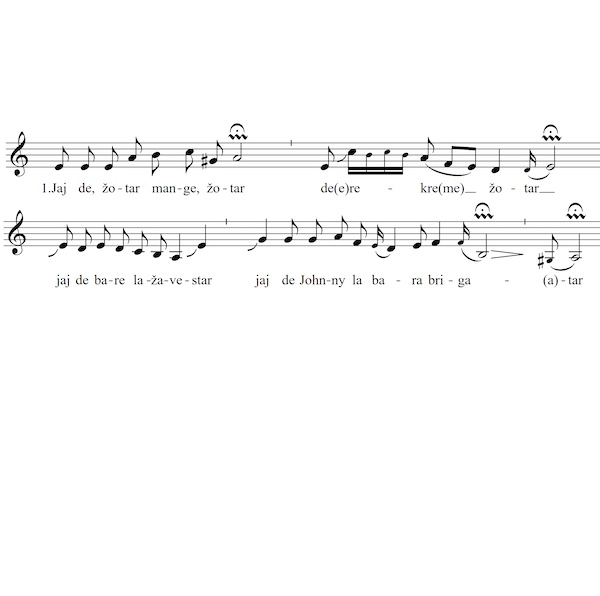
Žo-tar mange, žo-tar
- Genre
- langsames Lied
- Thema
- Klagelied
- DOI
- doi.org/10.21939/6md1-r144
Content
Recording
Žo-tar mange, žo-tar is a sad song about a woman's infidelity and her unhappy husband. Despite the shame caused by the adultery, the man tries to preserve his honour within the community and invites the Roma to drink.
Musical transcription based on the booklet accompanying the CD Amare gila - Unsere Lieder / Our Songs
The slow song Žo-tar mange, žo-tar is about a man being abandoned by his wife. He laments his suffering and focuses on the small children left behind who have now lost their mother. The social environment is also addressed. The ethnomusicologist Ursula Hemetek explains:

„It is a shame to have been abandoned and one must strive to regain one's honor. […] The loved ones are invited to drink and celebrate to wash away the shame. This gesture shows the strong bond between the individual and the group, a characteristic of Romani culture. In Žo-tar mange, žo-tar, the woman who has left her husband does not come back. They drink together and prove that they are still honourable.“
Žo-tar mange, žo-tar is an old song that Ruža Nikolić-Lakatos learned from her father. He in turn knew it from his parents. It is difficult to determine exactly when the song was written, but it is at least three generations old. Ruža changed the song to suit her personal taste so that it was connected to her life. She incorporated the names of her sons Johnny and Sascha. Informally, she also called it „Johnny's song“.
Source:
- Amare gila - Unsere Lieder – Our Songs. Ruža Nikolić-Lakatos u.a., eine Dokumentation der Lovaraliedkultur in Österreich. CD mit Begleitheft. In der Reihe: Tondokumente zur Volksmusik in Österreich Vol.4, März 1994, Neuauflage 1998.
Commentary
(GERMAN ONLY) The singer Ruža Nikolić-Lakatos explains the meaning of Žo-tar mange, žo-tar to ethnomusicologist Ursula Hemetek. It is a sad song and she always gets very emotional when she sings it. She also emphasizes that it is a well-known, old song.
Lyrics
Stanza 1
| Jaj de žo-tar mange, žo-tar, | I'm going away, going away, |
| de erekre žo-tar | I am going away forever, |
| jaj de bare lažavestar, | because of the great shame, |
| jaj de Johnny, la bara brigatar. | Johnny, and the great sorrow. |
Stanza 2
| Jaj de so kero ma, Devla, | What should I do, God? |
| kaj šo muro šero? | where should I lay my head? |
| Jaj de bare gindondar, | It is heavy with thoughts |
| jaj de mamo, la bara brigatar. | and great sorrow. |
Stanza 3
| Jaj de xoxadas ma, mamo, | She lied to me, mother, |
| de kodi bari kurva, | that great whore, |
| jaj de čoradas de, mamo, | she left my little children |
| jaj de mure cigne xurde šaven. | in poverty. |
Stanza 4
| Jaj de žutisar ma, Devla, | Help me, God, |
| jaj de na muk te xasajvav, | do not let me perish, |
| jaj de te šaj kerav vi me | so that I too, Johnny, |
| jaj de Johnny, e Romengi voja. | can bring joy to the Roma. |
Stanza 5
| Apal phendas: | Again, he said: |
| Jaj de mang mol, Johnny, mang mol | Order wine, Johnny, order |
| de bute Romenge! | wine for the many Roma. |
| Jaj de Johnny mol mangela, | Johnny will order wine |
| jaj de Saša apal pokjnela. | and Sascha will pay. |
Stanza 6
| Jaj de keras, Johnny, keras | Johnny, we bring |
| de e Romengi voja | joy to the Roma, |
| jaj de te na phenen, dade, | so that they don't say, son, |
| jaj de či sam ame laše šave. | that we're not good boys. |
| Sa tja patjivake, Uschi! | In your honour, Uschi! |
Literature
- Hemetek, Ursula: Comparison of Žo-tar mange žo-tar and Tu gelan tar a lumasa, a slow song and a new song; In: Amare gila - Unsere Lieder – Our Songs. Ruža Nikolić-Lakatos u.a., eine Dokumentation der Lovaraliedkultur in Österreich. CD mit Begleitheft. In der Reihe: Tondokumente zur Volksmusik in Österreich Vol.4, März 1994, Neuauflage 1998. PDF
Zitierempfehlung anzeigen
Bitte zitieren Sie diese Seite wie folgt:
Music and Minorities Research Center, "Žo-tar mange, žo-tar", Ružake gila, zuletzt besucht am Loading date..., doi.org/10.21939/6md1-r144


